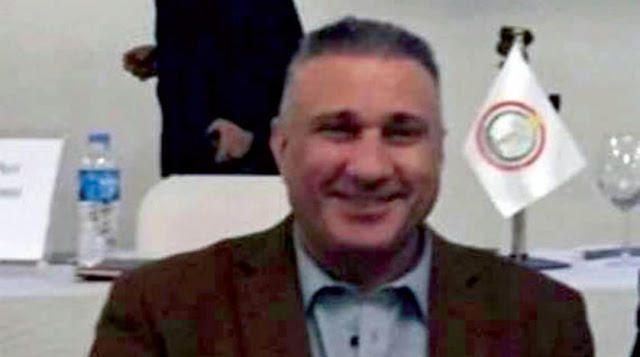Seth Frantzman: Analysis: Israel’s key Middle East concerns in 2021
For Israel, a continuing priority is that Jerusalem views Iran’s threats as existential and Israel will work to prevent that threat.'Time to change anachronistic laws of war,' says Israeli counterterrorism expert
“No security or political leadership will ever accept an existential threat,” says the senior official. In Feb. 2021, Iran threatened to enrich uranium to 60-percent, rejected talks with the U.S. in Europe, and sought to use nuclear inspections as bargaining chips with the IAEA.
“The presence of multiple uranium particles of anthropogenic origin, including isotopically altered particles, at a location which was not declared by Iran, is a clear indication that nuclear material and/or equipment contaminated by nuclear material has been present at this location,” said IAEA Director-General Rafael Mariano Grossi to the IAEA Board of Governors, on March 1.
The track record of Iran’s enrichment, including installing advanced IR-6 centrifuges at Natanz and Fordow, puts Iran back on the course it pursued in 2012 when Prime Minister Benjamin Netanyahu warned about a red line on enrichment. Iran was warned in October 2012 about enrichment to 60 percent.
Second, the Israeli official noted how important U.S. commitment to the region is for stability. “There is no substitute for U.S. power and influence in the Middle East. There is never a vacuum in the Middle East, and any voids will eventually be filled.” He noted that Israel and U.S. have an unshakeable bond based on shared values and bipartisan support in the U.S., which is crucial to Israel’s security. The special relationship with U.S. is an essential part of Israel’s national security, alongside the peace with Egypt, Jordan, UAE and Bahrain.
Third, in the context of Iranian entrenchment and Iranian proxy threats, the U.S. and western allies can count on Israel. Israel and the U.S. have been in close contact since the new Biden administration came into office. U.S. Secretary of State Antony Blinken spoke to his Israeli counterpart Gabi Asheknazi in late January and again in late February. The National Security Advisors Jake Sullivan and Meir Ben-Shabbat spoke on Jan. 23, and U.S. President Joe Biden spoke with Israel’s Prime Minister Benjamin Netanyahu spoke in mid-February.
The decision by the International Criminal Court (ICC) in The Hague to launch an investigation into Israeli actions warrants an urgent response that should include a push to reform the existing laws of war, a leading counter-terrorism expert told JNS.
Professor Boaz Ganor, founder and executive director of the International Institute for Counter-Terrorism in Herzliya, said, "The response to this dangerous step by the court is to urgently change the anachronistic laws of war and to adjust them to the challenges of war in the face of hybrid terror organizations."
Ganor defined hybrid terrorist organizations as those entities that control territories and populations, such as Hamas in Gaza, Hezbollah and Lebanon, and until 2019, ISIS in Syria and Iraq. "They embed themselves in civilian populations and use civilians, even children, as living shields," he said.
Terror organizations are on an evolutionary path, able to adapt themselves and to cynically exploit "every opportunity they encounter," he continued. This means that "enlightened states must unite, through professional experts, jurists and others to formulate fair laws of war that will allow states to defend themselves against these terror organizations while maintaining a maximum protection of the lives of citizens."
The new laws of war should "place the blame on harm to civilians first and foremost on those who use them cynically as living shields," he argued.
Part of that adaptation involves taking advantage of the constraints placed on liberal democracies by humanitarian international law – particularly, the obligation by states to avoid harming civilians in line with the principles of discernment and proportionality, according to Ganor.
"In order to challenge these states, modern terror organizations, especially hybrid organizations, place weapons storehouses and rocket launchers in underground sites underneath residential homes and under-protected facilities like hospitals, medical clinics, schools and others," he said.
"These organizations do not see themselves as being obligated to humanitarian international law, and they use civilian hiding places to conduct random attacks on civilian areas and facilities in the territory of an enemy state. From this perspective, the states dealing with such terrorists find themselves being Gulliver, with their hands and legs bound by morality and by modern combat principles, fighting dwarfs that attack without pause and in violation of every legal or moral principle."
Israel’s Homeland Security Is Collapsing
From its establishment to the present day, Israel is a country that has invested its efforts in the security of its borders against surrounding countries. Countless efforts have been made to develop technologies and capabilities that have, at all times, preserved the military and defensive superiority of the State of Israel in the face of the non-stop threats that it faces.
At the same time, a clear outlook also developed — that military operations can be contained by on-duty forces in the short term, but that war can only be won by reservists. It is not by chance that the ratio of reservists and regular personnel is one regular person for every four reservists. Reservists are the most caring, and also the most influential, population in times of emergency, as history teaches.
But given that the State of Israel knows how to successfully defend its borders, how can we explain the failure in protecting its homeland security?
The state of violence prevailing in almost every aspect of our life has become an existential issue.
It is now routine that thousands of businesses have to pay “protection money” to criminals; frequent murders are happening in Arab society, and women are frequent victims; illegal construction now amounts to an incalculable number of buildings; an unimaginable amount of illegal weapons are found in our society; there is terrorism and agricultural theft in huge quantities; and, in practice, there is almost no police presence or enforcement of any kind in many areas, especially in the Negev.















































